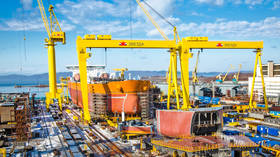Rosneft gets into oil shipping ahead of EU embargo

Russian oil major Rosneft is expanding its tanker chartering business in a bid to simplify oil delivery to customers ahead of the EU sanctions, which include a ban on insuring Russian oil shipments, Reuters reported on Tuesday, citing people familiar with the matter.
Prior to sanctions, Rosneft was using the free-on-board (FOB) scheme in oil sales, offering the crude at port, while the buyer had to charter tankers, pay freight, insurance, and delivery costs. Previously, the company had long-term contracts with major trading groups that covered most of the operational costs.
But with the EU ban on insuring tankers carrying Russian oil coming into force on December 5, customers are asking Rosneft to ensure delivery to the final destination and cover insurance and freight expenses.
Russia still sells substantial volumes of crude to the EU, but once the embargo comes into effect, it will have to redirect 25% of its oil exports to new markets.
Data from Refinitiv Eikon shows that seaborne exports of Russian Urals crude to Asia have already jumped sixfold in January-September compared to the same period in 2021. India increased its oil purchases by 13.5 times year-on-year in the first eight months of this year. China, meanwhile, became the biggest importer of Russian oil between May and July 2022.
By offering freight services, Rosneft will help customers from regions not subject to sanctions to receive oil supplies without delays, given that many of them are unable to handle freight and shipping.
For more stories on economy & finance visit RT's business section












